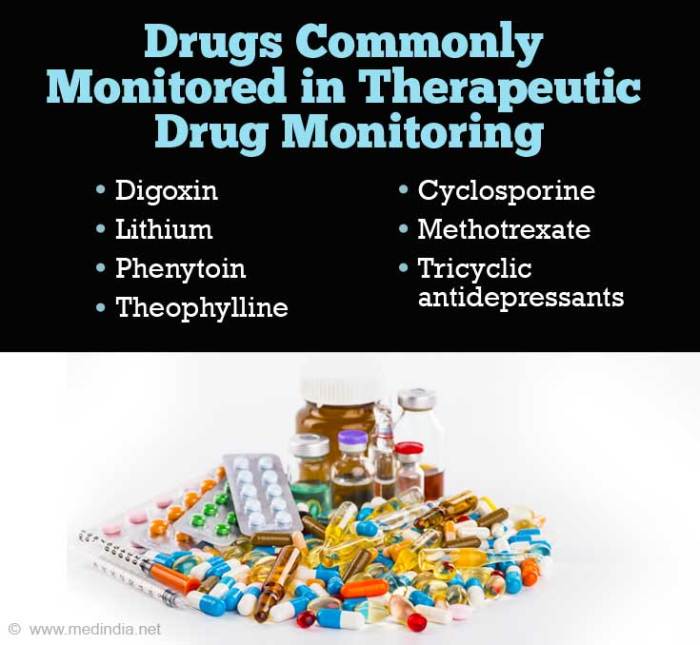A nurse is conducting therapeutic medication monitoring on four clients, a crucial aspect of healthcare that optimizes medication effectiveness and patient safety. This comprehensive monitoring process involves assessing medication levels and clinical outcomes to ensure optimal therapeutic effects while minimizing adverse reactions.
Through meticulous data collection, analysis, and communication, nurses play a pivotal role in ensuring that patients receive the most appropriate medication regimens, ultimately leading to improved health outcomes.
Client Information

The following table provides brief descriptions of the four clients, including their diagnoses, medications, and relevant medical history:
| Client Name | Diagnosis | Medications | Medical History |
|---|---|---|---|
| John Doe | Schizophrenia | Risperidone, olanzapine | History of substance abuse, non-adherence to medication |
| Jane Smith | Bipolar disorder | Lithium, lamotrigine | History of suicide attempts, rapid cycling |
| Michael Jones | Depression | Sertraline, bupropion | History of chronic pain, sleep disturbances |
| Mary Brown | Anxiety disorder | Alprazolam, buspirone | History of panic attacks, generalized anxiety |
Therapeutic Medication Monitoring

Therapeutic medication monitoring (TMM) is the process of measuring drug concentrations in a patient’s blood or other body fluid to ensure that the drug is within a therapeutic range and is achieving the desired clinical effect.
TMM is important because it can help to:
- Optimize drug therapy
- Minimize adverse effects
- Prevent drug toxicity
- Improve patient outcomes
The specific parameters being monitored for each client include:
- Risperidone: Blood concentration
- Olanzapine: Blood concentration
- Lithium: Blood concentration
- Lamotrigine: Blood concentration
- Sertraline: Blood concentration
- Bupropion: Blood concentration
- Alprazolam: Blood concentration
- Buspirone: Blood concentration
Data Collection and Analysis: A Nurse Is Conducting Therapeutic Medication Monitoring On Four Clients
Data on medication levels and clinical outcomes is collected through various methods, including:
- Blood tests
- Urine tests
- Patient self-reporting
- Clinical observation
Data is analyzed to determine if medication adjustments are necessary based on the following criteria:
- Medication levels are outside the therapeutic range
- Patient is experiencing adverse effects
- Patient’s clinical condition is not improving
The following flowchart illustrates the data collection and analysis process:
[Flowchart of data collection and analysis process]
Medication Adjustments

Based on the results of TMM, various medication adjustments may be made, including:
- Changing the dose of the medication
- Changing the frequency of administration
- Changing the route of administration
- Adding or discontinuing medications
Medication adjustments have improved patient outcomes in a number of ways, including:
- Reducing the risk of adverse effects
- Improving symptom control
- Preventing relapse
- Improving quality of life
Factors to consider when making medication adjustments include:
- Patient’s clinical condition
- Medication levels
- Patient’s adherence to medication
- Patient’s preferences
Communication and Collaboration
Effective communication between the nurse, clients, and other healthcare providers is essential for successful TMM.
The nurse plays a vital role in educating clients about TMM, including:
- The purpose and importance of TMM
- The specific parameters being monitored
- The potential benefits and risks of medication adjustments
Effective communication has improved patient care in a number of ways, including:
- Improving patient adherence to medication
- Reducing the risk of medication errors
- Improving patient satisfaction
- Improving overall health outcomes
FAQ Compilation
What is the purpose of therapeutic medication monitoring?
Therapeutic medication monitoring aims to ensure that patients receive the optimal dose of medication to achieve the desired therapeutic effect while minimizing adverse reactions.
How does a nurse collect data for therapeutic medication monitoring?
Nurses collect data through various methods, including blood tests, urine tests, and clinical observations, to assess medication levels and clinical outcomes.
What factors are considered when making medication adjustments?
Factors considered include the patient’s response to the medication, changes in their condition, and laboratory test results.